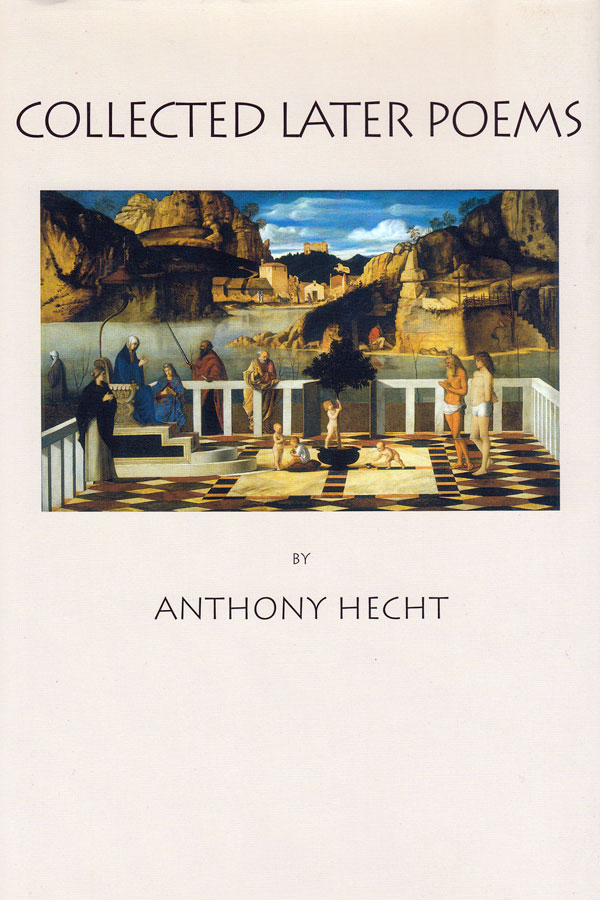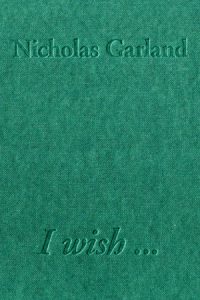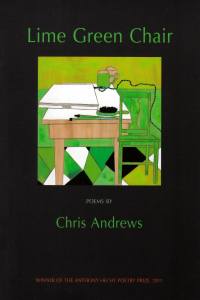Collected Later Poems
£13.95
Anthony Hecht earned a place alongside such poets as W. H. Auden, Robert Frost, and Elizabeth Bishop. Here under one cover are his three last collections – The Transparent Man, Flight Among the Tombs, and The Darkness and the Light. The perfect companion to his Collected Earlier Poems (continuously in print since 1990), this book brings the eloquent sound of Hecht’s music to bear on a wide variety of human dramas: from a young woman dying of leukemia to the tangled love affairs of A Midsummer Night’s Dream; from Death as the director of Hollywood films to the unexpected image of Marcel Proust as a figure skater:
He glides with a gaining confidence, inscribes
Tentative passages, thinks again, backtracks,
Comes to a minute point,
Then wheels about in widening sweeps and lobes,
Large Palmer cursives and smooth entrelacs,
Preoccupied, intent
On a subtle, long-drawn style and pliant script
Incised with twin steel blades and qualified
Perfectly to express,
With arms flung wide or gloved hands firmly gripped
Behind his back, attentively, clear-eyed,
A glancing happiness.
Collected Later Poems
Praise for The Transparent Man
"Full of delight … Hard as it is to distinguish inborn genius from the long labor that substantiates it, I am as immensely impressed by the native gift that was there from the beginning as I am by the rich development in successive volumes." – Howard Nemerov, Washington Times
"Some poets are saved by grace, others by will. Mr Hecht began as a poet of convenience and charm, of difficult form and baroque extravagance … Scarred by a history whose lessons will be ignored, and whose lessons will murder us, he has become our only poet who is able to horrify … The beauty of his language is stilled by the horror of knowledge." – William Logan, New York Times Book Review
"In intricate formal patterns that even his ablest contemporaries (James Merrill and John Hollander) would envy, Hecht delivers elegies, lyrics, and dramatic monologs with equal grace and wit. But one poem rises monolithically above the rest. ‘See Naples and Die’ is a travel narrative at once funny (‘only a nation/ Devoted to the cult of the madonna/ With all its doctrinal embellishments/ Could produce "extra virgin olive oil"’) and grim (the Elysian Fields are ‘a vacant wilderness of weeds’). If filmed by Fellini or painted by Bosch, the story could not be more harrowing or apocalyptic. – Fred Muratori, Cornell University Library.
Praise for Flight Among the Tombs
"Anthony Hecht’s majestic development into a great poet has progressed across half a century. Flight Among the Tombs is Hecht’s poignant and ironic masterpiece. With this book, he clearly becomes a fourth in the sequence of John Crowe Ransom, W.H. Auden and James Merrill – great verse-artists who are also humanist sages and wise sensibilities. Few poets stand with henry James and Marcel Proust: Ransom, Auden, Merrill, and Hecht are in that company." – Harold Bloom
"Hecht is often ranked among such luminaries as W. H. Auden and James Merrill, an assessment based on his adroitness with form, classical frame of reference, and suppleness of thought and imagination. These traits are evident in this striking, two-part volume. The first section, "Presumptions of Death," consists of a collaboration between Hecht and artist Leonard Baskin, whose wood engravings illustrate a remarkably ironic series of poems written from death’s point of view. Hecht’s grim reaper takes many shapes: an inquisitor, a whore, an archbishop, a painter, an Oxford don, a Mexican revolutionary, a film director, and a carnival barker. Whatever his guise, he is always amused, assuring us that "I shall press to the core of every secret. / There is no match for my patience." These visions of death are at once wickedly clever and quite unsettling. The remainder of the book contains new poems on various subjects, but death haunts those pages, too, as Hecht bids adieu to soul mates James Merrill and Joseph Brodsky". – Donna Seaman, Booklist
Praise for The Darkness and the Light
“Hecht, for all his pessimism, is fascinated by the sheer sumptuous richness of things … He loves language as much as he loves the visible world, and handles rhyme and meter with the same scrupulous, almost sensuous attention to detail as he paints still life … [He has] the sharp eye for pretension of a latter-day Byron … A wry and wholly contemporary American voice.” – Al Alvarez, New York Review of Books
“Hecht’s superb new collection is stuffed with rich and complex poems that beggar easy description and that demand our closest scrutiny. One reading won’t be enough to yield the fullness of meaning and the artfulness of language and form embodied in these poems.” – George Core, Sewanee Review
“The … poems in this latest volume reflect the distinct versatility and disciplined precision that have marked his craft, in both free and strictly formal verse, from the beginning … If certain poets are still regarded as prophets, gifted with extraordinary spiritual and moral insight, Anthony Hecht is surely a price among prophets.” – Charles Guenther, St Louis Post-Dispatch
“His gifts are of a kind rare today – seriousness, intelligence, formal discipline – and he has expressed as skilfully as any writer of the last fifty years the anxiety of the civilized mind facing the large and small barbarisms of the age.” – Adam Kirsch, The New Republic
I
Some thin gray smoke twists up against a sky
Of German silver in the sullen dusk
From a small chimney among leafless trees.
The paths are empty, the weeds bent and dead;
Winter has taken hold. And what, my dear,
Does this remind you of? You are surprised
By the familiar manner, the easy, sure
Intimacy of my address. You wonder
Whose curious voice is this? Why should that scene
Seem distantly familiar? Did something happen
Back in my youth on a deserted path
Late on some unremembered afternoon?
And now you’ll feel at times a fretful nagging
At the back of your mind as of something almost grasped
But tauntingly and cunningly evasive.
It may go on for months, perhaps for years.
Think of the memory game that children played
So long ago. A grownup brought a tray
Laden with objects hidden by a shawl
Or coverlet with fine brocaded flowers
Beneath which, like the roofs of a small city,
Some secret things lay cloaked. Then at a signal
The cloth was whisked away for thirty seconds.
You were allowed to do nothing but look,
And then the cover was replaced. Remember?
The tray contained bright densely crowded objects,
Sometimes exotic–a small cloisonne egg,
A candle-snuffer with an ivory handle–
But simple things as well. It never occurred
To any of the children there to count them;
You had been told simply to memorize
The contents of the tray. Each child was given
Paper and pencil to list what he recalled
And no one ever finally got them all;
Something always escaped. Perhaps a needle,
A gum eraser or a plastic ruler.
And so it is that now, as you’re about
To eat or light a cigarette, something
Passes too swiftly before you can take aim,
Passes in furtive silence, in disguise,
Glimpsed only hazily in retrospect–
Like a clock’s strokes recounted once they’re done,
Never with confidence.
And now you’re angry
At what you think of as my long digression
When in fact it’s the eclipses of your mind,
Those sink-holes, culverts, cisterns long avoided
As dangerous, where the actual answer lies.
As for my indirection, I’ll just say
I have more time than I know what to do with.
Let me give you a hint. The voice you hear
Is not the voice of someone you remember–
Or rather, it’s that voice now greatly altered
By certain events of which you’ve partly heard,
Partly imagined, altogether feared.
Does that help? No, I didn’t think it would.
Perhaps we can return another time
(A time when you’re conveniently abstracted)
To the topic of my voice and of that smoke.
II
Much time elapses. (I could count the days;
You, for your part, have no idea how many.)
Today a color ad for undergarments,
Some glossy pages of Victoria’s Secret,
Modeled by a young blonde catches your eye.
Nothing so vivid as a memory
Results. Perhaps a vague erotic sense,
A fleeting impulse down between your legs,
Stirs like a sleeping dog. Your mind begins
Its little, paltry Leporello’s list
Of former girlfriends who pass in review
As images, stripped even of their names.
And then you linger upon one. It’s me.
Don’t be surprised. All that was long ago.
Your indolent thought goes over my young breasts,
Remembering, fondling, exciting you.
How very long ago that was. It lasted
Almost two years. Two mainly happy years.
In all that time, what did you learn of me?
My name, my body, how best to go about
Mutual arousal, my taste in food and drink
And what would later be called "substances."
(These days among my friends I might be called
"A woman of substance" if I were still around.)
You also learned, from a casual admission,
That I had twice attempted suicide.
Tact on both sides had left this unexplored.
We both seemed to like sex for the same reason.
It was, as they used to say, a "little death,"
A tiny interval devoid of thought
When even sensation is so localized
Only one part of the body seems alive.
And when you left I began the downhill slope.
First one-night stands; then quickly I turned pro
In order to get all the drugs I wanted.
My looks went fast. I didn’t really care.
The thing that I’d been after from the first,
With you, with sex, with drugs, was oblivion.
So it was easy. A simple overdose
Knocked back with half a bottle of good Scotch.
In later years the rumors found you out
Through mutual friends. And somehow you remembered
That I had been disowned by my family.
My parents would have nothing to do with me
After they found I’d been a prostitute,
To say nothing of my trial suicides.
So, as you guessed, when I at last succeeded,
They acted as if I never had been born.
("Let the day perish …," as the scripture says.)
There was no funeral, no cemetery,
Nowhere for you to come in pilgrimage–
Although from time to time you thought of me.
Oh yes, my dear, you thought of me; I know.
But less and less, of course, as time went on.
And then you learned by a chance word of mouth
That I had been cremated, thereby finding
More of oblivion than I’d even hoped for.
And now when I occur to you, the voice
You hear is not the voice of what I was
When young and sexy and perhaps in love,
But the weary voice shaped in your later mind
By a small sediment of fact and rumor,
A faceless voice, a voice without a body.
As for the winter scene of which I spoke–
The smoke, my dear, the smoke. I am the smoke.
The Waywiser Press
Witness
Against the enormous rocks of a rough coast
The ocean rams itself in pitched assault
And spastic rage to which there is no halt;
Foam-white brigades collapse; but the huge host
Has infinite reserves; at each attack
The impassive cliffs look down in gray disdain
At scenes of sacrifice, unrelieved pain,
Figured in froth, aquamarine and black.
Something in the blood-chemistry of life,
Unspeakable, impressive, undeterred,
Expresses itself without needing a word
In this sea-crazed Empedoclean Strife.
It is a scene of unmatched melancholy,
Weather of misery, cloud cover of distress,
To which there are no witnesses, unless
One counts the briny, tough and thorned sea holly.
The Waywiser Press
“The Darkness and the Light Are Both Alike to Thee”
– Psalms 139:12
Like trailing silks, the light
Hangs in the olive trees
As the pale wine of day
Drains to its very lees:
Huge presences of gray
Rise up, and then it’s night.
Distantly lights go on.
Scattered like fallen sparks
Bedded in peat, they seem
Set in the plushest darks
Until a timid gleam
Of matins turns them wan,
Like the elderly and frail
Who’ve lasted through the night,
Cold brows and silent lips,
For whom the rising light
Entails their own eclipse,
Brightening as they fail.
The Waywiser Press
Excerpts
Death the Whore
I
Some thin gray smoke twists up against a sky
Of German silver in the sullen dusk
From a small chimney among leafless trees.
The paths are empty, the weeds bent and dead;
Winter has taken hold. And what, my dear,
Does this remind you of? You are surprised
By the familiar manner, the easy, sure
Intimacy of my address. You wonder
Whose curious voice is this? Why should that scene
Seem distantly familiar? Did something happen
Back in my youth on a deserted path
Late on some unremembered afternoon?
And now you'll feel at times a fretful nagging
At the back of your mind as of something almost grasped
But tauntingly and cunningly evasive.
It may go on for months, perhaps for years.
Think of the memory game that children played
So long ago. A grownup brought a tray
Laden with objects hidden by a shawl
Or coverlet with fine brocaded flowers
Beneath which, like the roofs of a small city,
Some secret things lay cloaked. Then at a signal
The cloth was whisked away for thirty seconds.
You were allowed to do nothing but look,
And then the cover was replaced. Remember?
The tray contained bright densely crowded objects,
Sometimes exotic--a small cloisonne egg,
A candle-snuffer with an ivory handle--
But simple things as well. It never occurred
To any of the children there to count them;
You had been told simply to memorize
The contents of the tray. Each child was given
Paper and pencil to list what he recalled
And no one ever finally got them all;
Something always escaped. Perhaps a needle,
A gum eraser or a plastic ruler.
And so it is that now, as you're about
To eat or light a cigarette, something
Passes too swiftly before you can take aim,
Passes in furtive silence, in disguise,
Glimpsed only hazily in retrospect--
Like a clock's strokes recounted once they're done,
Never with confidence.
And now you're angry
At what you think of as my long digression
When in fact it's the eclipses of your mind,
Those sink-holes, culverts, cisterns long avoided
As dangerous, where the actual answer lies.
As for my indirection, I'll just say
I have more time than I know what to do with.
Let me give you a hint. The voice you hear
Is not the voice of someone you remember--
Or rather, it's that voice now greatly altered
By certain events of which you've partly heard,
Partly imagined, altogether feared.
Does that help? No, I didn't think it would.
Perhaps we can return another time
(A time when you're conveniently abstracted)
To the topic of my voice and of that smoke.
II
Much time elapses. (I could count the days;
You, for your part, have no idea how many.)
Today a color ad for undergarments,
Some glossy pages of Victoria's Secret,
Modeled by a young blonde catches your eye.
Nothing so vivid as a memory
Results. Perhaps a vague erotic sense,
A fleeting impulse down between your legs,
Stirs like a sleeping dog. Your mind begins
Its little, paltry Leporello's list
Of former girlfriends who pass in review
As images, stripped even of their names.
And then you linger upon one. It's me.
Don't be surprised. All that was long ago.
Your indolent thought goes over my young breasts,
Remembering, fondling, exciting you.
How very long ago that was. It lasted
Almost two years. Two mainly happy years.
In all that time, what did you learn of me?
My name, my body, how best to go about
Mutual arousal, my taste in food and drink
And what would later be called "substances."
(These days among my friends I might be called
"A woman of substance" if I were still around.)
You also learned, from a casual admission,
That I had twice attempted suicide.
Tact on both sides had left this unexplored.
We both seemed to like sex for the same reason.
It was, as they used to say, a "little death,"
A tiny interval devoid of thought
When even sensation is so localized
Only one part of the body seems alive.
And when you left I began the downhill slope.
First one-night stands; then quickly I turned pro
In order to get all the drugs I wanted.
My looks went fast. I didn't really care.
The thing that I'd been after from the first,
With you, with sex, with drugs, was oblivion.
So it was easy. A simple overdose
Knocked back with half a bottle of good Scotch.
In later years the rumors found you out
Through mutual friends. And somehow you remembered
That I had been disowned by my family.
My parents would have nothing to do with me
After they found I'd been a prostitute,
To say nothing of my trial suicides.
So, as you guessed, when I at last succeeded,
They acted as if I never had been born.
("Let the day perish ...," as the scripture says.)
There was no funeral, no cemetery,
Nowhere for you to come in pilgrimage--
Although from time to time you thought of me.
Oh yes, my dear, you thought of me; I know.
But less and less, of course, as time went on.
And then you learned by a chance word of mouth
That I had been cremated, thereby finding
More of oblivion than I'd even hoped for.
And now when I occur to you, the voice
You hear is not the voice of what I was
When young and sexy and perhaps in love,
But the weary voice shaped in your later mind
By a small sediment of fact and rumor,
A faceless voice, a voice without a body.
As for the winter scene of which I spoke--
The smoke, my dear, the smoke. I am the smoke.
The Waywiser Press
Witness
Against the enormous rocks of a rough coast
The ocean rams itself in pitched assault
And spastic rage to which there is no halt;
Foam-white brigades collapse; but the huge host
Has infinite reserves; at each attack
The impassive cliffs look down in gray disdain
At scenes of sacrifice, unrelieved pain,
Figured in froth, aquamarine and black.
Something in the blood-chemistry of life,
Unspeakable, impressive, undeterred,
Expresses itself without needing a word
In this sea-crazed Empedoclean Strife.
It is a scene of unmatched melancholy,
Weather of misery, cloud cover of distress,
To which there are no witnesses, unless
One counts the briny, tough and thorned sea holly.
The Waywiser Press
"The Darkness and the Light Are Both Alike to Thee"
- Psalms 139:12
Like trailing silks, the light
Hangs in the olive trees
As the pale wine of day
Drains to its very lees:
Huge presences of gray
Rise up, and then it's night.
Distantly lights go on.
Scattered like fallen sparks
Bedded in peat, they seem
Set in the plushest darks
Until a timid gleam
Of matins turns them wan,
Like the elderly and frail
Who've lasted through the night,
Cold brows and silent lips,
For whom the rising light
Entails their own eclipse,
Brightening as they fail.
The Waywiser Press





